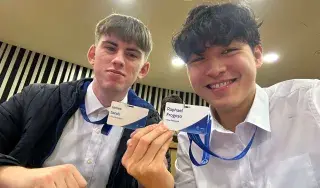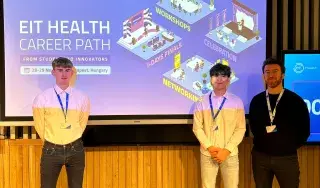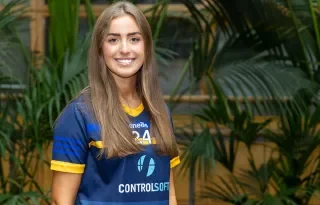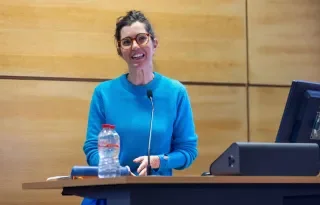DkIT I-Days team pitch ‘Narconnect’ patch at Budapest EIT Health Finals
A DkIT student team recently participated in the final of the EIT Health I-Days Innovation competition in Budapest.
This event brought together students from 25 European Universities who had previously won their regional challenge competitions. The DkIT ‘NarConnect’ team comprised of James Sands (Maths & Data Analytics), Jordana Hamilton (Bioscience), and Raphael Frogoso (Software Development). The EIT Health I-Days are part of a Europe-wide initiative designed to inspire and nurture the next generation of healthcare innovators.



As part of the Dundalk I-Days’ competition in October, the team developed an innovative Bluetooth-enabled patch, designed to assist in symptom recognition and analysis. The patch was also designed to alert users of impending narcoleptic episodes, reducing the need for frequent visits to clinical practitioners and increasing safety for the person living with narcolepsy. Following their success in the DkIT competition, Team NarConnect continued to refine their solution under the mentorship of Breanndán Casey from the Connected Health and Wellbeing Cluster and Ceara Treacy, of dConnect in addition to other mentors from the day.
Speaking about the experience, Raphael Frogoso said:
“attending the Budapest final allowed us to meet like-minded health innovators from across Europe and we heard numerous inspirational talks from fellow-students and established entrepreneurs. This included the winning team from Nicosia who are developing pHera, a device designed to provide a faster and safer method for confirming Nasogastric (NG) tube placement.”
Breanndán Casey, manager of the Connected Health Cluster said:
“Narconnect worked together as a team, combining skills across software development, data analytics, and science. They also used the Design Thinking process to break down the challenges of living with Narcolepsy. It was great to see the team refine their idea and with the FabLab at Creative Spark in Dundalk to develop a prototype which included changing from a patch to a wristband and supporting software.”
The success of the Dundalk event was made possible through the generous support of key sponsors, including Takeda UK and Ireland, HSE Technology and Transformation, and Nordic Global.


